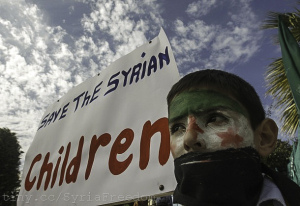
Such an assessment is encouraging, as not so long ago, the world was holding its breath, expecting an air strike by the U.S.A. on this country. The pretext for it was the hysteria about the alleged involvement of the authorities of the SAR in the use of chemical weapons against its civilian population.
The air strike was avoided: Damascus agreed to transfer its weapons under international control, showing its desire and willingness to act responsibly and constructively. There was a sense that we were seeing some flashes of light in the dark tunnel of the internal crisis of this country, which had led to many deaths and great suffering of the Syrian people. It seemed that the Western media, human rights activists and politicians, who claimed they cared about the freedom of Syrians, should have been paying attention to this.
It seems, however, that they have failed to notice these changes. Stagnation in the previous form still prevails in the information field around Syria. The events are still covered in the same black-and-white light – as the opposition to “despotism by a rebellious people”. By itself, the formula of rejection of the current government of B. al-Assad is shortsighted and unproductive, against the background of the rapidly changing events in the country. After all, it is impossible to totally eliminate the chemical weapons arsenal, without a firm and unified leadership in Syria.
Under the conditions of the current armed struggle, these weapons can get into the hands of irresponsible gangs, which can use them to blackmail both their neighbors and rivals. The world has already witnessed the sad experience of Libya, when stocks of conventional weapons that remained, after Muammar Gaddafi was killed, were spread across the region. In particular, this served as a detonator for the unrest in Mali. And what if there were also chemical weapons in Libya?
Pedaling the thesis of having B. al-Assad withdraw from the game is playing into the hands of the stubborn anti-government armed opposition. In fact, this opposition is a uniting of disparate groups, which are often hostile to each other, on the basis of the general hatred for the current regime, and gives them the illusion of a possible victory. The rise of radical fractions, including jihadist ones, is not surprising on this background. The largest of these, the Islamic State of Iran and the Levant, has recently sounded the bell, calling on other Islamic groups to create mass mobilization against the advancing government troops. In recent days, it has managed to regain control of several towns, villages and roads around the city of Aleppo.
The face of the civil strife is disgusting everywhere, and its logic of mutual strikes to gain advantages over the enemy is scary. This fuels the mutual intractability. Because of this, the noose of the internal Syrian crisis, where mercenaries from abroad are actively involved, is tightening more and more.
This naturally makes it difficult to promote the convening of the Geneva-2 Conference and involving a wide range of representatives of the opposition into it, to achieve a dialogue between the warring parties. According to Qadri Jamil, leader of the Popular Front for Change and Liberation of Syria, every day, up to 200 people are killed in the country. The losses from damages are estimated at $100 billion. Winter is coming with its cold, and a dense shadow of a humanitarian disaster is looming over the Syrian people.
If the tough opposition continues, the destruction of the country, its industrial and economic base, material and human resources will become irreversible. A legitimate question arises – will there be a winner on the ruins of a devastated country, and what will he get? What is going to happen to the numerous radical mercenaries who are financed from abroad, and who insist on the continuation of the war?
Will they remain in Syria, or will they move to the neighboring countries, or other parts of the world in search of a new “work” and adventures – to sow terror and hatred?
All these questions are very relevant today. After all, we are talking about the desire to bring the warring parties to the negotiating table in Geneva and finding a way to stop the fighting and violence – and then to begin a political dialogue on the arrangement and rebuilding of Syria. In this regard, a very important role is played by the media, the public and politicians in the West, who could carry a positive message in their materials and presentations aimed at reconciliation and compromise, rather than fanning the controversies between the Syrians.
Yuri Zinin, senior researcher at the Moscow State Institute, especially for the online magazine New Eastern Outlook.
